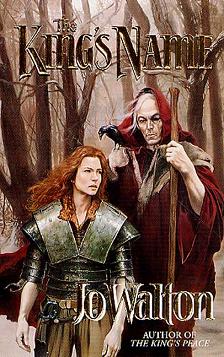
The King’s Name
Jo Walton
320 pages
published in 2001
“The first I knew about the civil war was when my sister Aurien poisoned me.”
As opening sentences go, the one that opens The King’s Name is great, starting off the sequel to Jo Walton’s The King’s Peace with a bang. It’s been five years after the end of the previous book, the peace that Sulien and her lord king Urdo had fought for so hard has held all these years, but there have been some rumblings amongst the kings and rulers of the countries of Tir Tanagiri about the high king’s rule. But for Sulien there was no real indication for danger until her sister poisoned her. Luckily one of her companions was quick enough to recognise it as poison and not a sudden drunkness and manages to get her back to her own lands, which is the only reason she survived. And then she comes home and her own steward tries it too. Something more is going on than just a grudge her sister may have held against her. Clearly she needs to warn Urdo and rejoin him to fight for the peace again…
With The King’s Name Jo Walton’s histoire à clef becomes more explicitely Arthurian, with Urdo as king Arthur, his wife Elenn as Guinever and Sulien as a distaff Lancelot, with the traditional love affair not between the queen and Sulien/Lancelot, but implied between Urdo/Arthur and Sulien. It’s long been supposed that the night Sulien spent with Urdo in his command tent early in her career was one of passion rather than exhaustion, with Sulien’s son Darien as the result. The civil war, started through the manipulations of the Modred equivalent Morthu, is of course also an Arthurian theme, the war that ends the Golden Age, kills the hero-king and restarts history. Not quite what happens here and don’t think that if you know the Arthurian template you know what Jo Walton is doing here.
The Arthurian legends for a start are explicitely Christian legends and while religion plays an important role in this story, Sulien, our protagonist/narrotor herself is emphatically not a follower of the White God, as the Christ equivalent in this history is called. Sulien respects all the gods, but believes in the old gods of her own lands, having been raised in the Vincean traditions of worship. Urdo too, while a follower of the White God and having been raised by his monks, respects and venerates the other gods equally. He has to, as the high king of the entirety of Tir Tanagiri it’s his duty to consult all the gods that inhabit the land and keep their believers free to worship.
Many other followers of the White God are less tolerant and would have liked to have Urdo or one of the White God’s saints to force the other gods out of the island altogether, as has happened in other places. This intolerance is a large part of what seems to drive the rebels against Urdo, though again it’s been manipulated by Morthu. Part of the King’s Peace is tolerance of all gods and Morthu wants to pull it down like he wants all other aspects of the peace.
But this is not a simple story of evil Christians versus noble pagans. The White God is an attractive god to worship as Walton shows, most of his followers genuinely puzzled by the idea that someone would not want to worship him. As Sulien makes clear in her introduction and conclusion to her story, the White God has won, has become the most worshipped god in the land, with the worship of other gods slowly dying out.
Which brings me to the main theme of the story. This is not a story about glory and finding fame in battle, this is a story about loss and melancholy, about having lived a long, fullfilled life but looking back at when you were still young and your friends were still alive. That bittersweet sense of melancholy is present all through the book, even more so than in the first one. This is not a book a young person could’ve written.
As a novel The King’s Name is better structured, more of a proper story than The King’s Peace, which suffered from having its plot fulfilled about twothirds of the way through the book. I found it to be moving, a real tearjerker in places.
No Comments